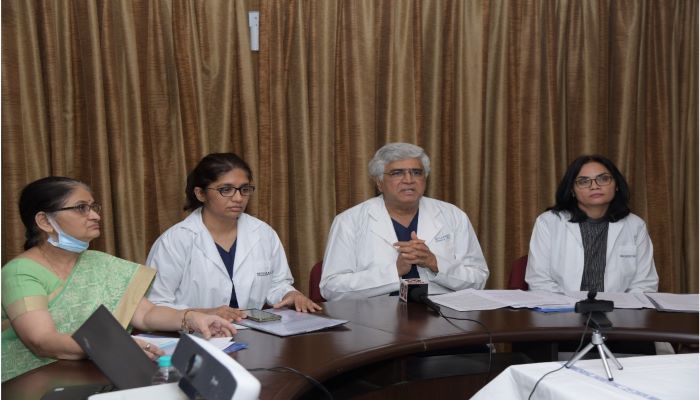The yoga protocol included gentle and restorative yoga postures(asana) with regular periods of relaxation and pranayama

As per a study by the Tata Memorial Hospital, inclusion of yoga in the treatment of breast cancer patients is highly beneficial and resulted in a 15% relative improvement in disease free survival (DFS) and 14% in overall survival (OS).
The yoga intervention was carefully designed with inputs from yoga consultants, clinicians as well as physiotherapists to suit the needs of breast cancer patients and survivors, keeping in focus the different phases of their treatment and recovery. The yoga protocol included gentle and restorative yoga postures(asana) with regular periods of relaxation and pranayama. It was implemented through classes by qualified and experienced yoga instructors. Additionally, handouts and CD’s of the protocol were provided for maintaining compliance.
The largest clinical trial is an important milestone in the use of yoga in breast cancer since this is the first example of a very Indian traditional remedy being tested in a rigorous western design of randomized study with robust sample size. Breast cancer is the commonest cancer affecting women not only in India but globally. It raises a huge amount of anxiety in women which is two fold, the first fear of cancer with threat to life and the second worry due to side effects of treatment and coping with it.
It is heartening to see that yoga practiced with rigour and perseverance has proved its superiority in maintaining excellent quality of life and has also numerically reduced the risk of recurrence and death by 15%.
Dr Nita Nair, presented in a SPOTLIGHT paper, the results of a landmark breast cancer study testing effect of yoga, as a SPOTLIGHT presentation at the ongoing San Antonio Breast Cancer Symposium (SABCS), one of the most prestigious breast cancer conferences in the world held annually in USA. Out of thousands of research papers submitted to the conference few are chosen for spotlight discussion and our study deserved this due to the novelty of intervention and the first very Indian intervention impacting outcomes in breast cancer.
The results of the study by the Tata Memorial Centre show that a commonly available and inexpensive drug, carboplatin, increased the cure rate and survival of a very aggressive type of breast cancer, called triple-negative breast cancer, especially among young women who have this disease. Until the results of this study there was no conclusive evidence that this drug should be routinely used as part of the treatment of this disease.
Dr. Sudeep Gupta, Professor of Medical Oncology at Tata Memorial Centre, presented, as a podium presentation, the results of the landmark ‘TMC Study - Platinum in TNBC’ at the ongoing San Antonio Breast Cancer Symposium, which is the largest and most important breast cancer conference in the world. Dr. Rajendra A. Badwe, Director, TMC, is the Principal Investigator of this study, which was conducted by the Breast Cancer Working Group of Tata Memorial Centre, Mumbai.
The study was a randomized controlled trial which enrolled women with stage II-III triple negative breast cancer from 2010 to 2020 who were divided into two groups, both of whom received chemotherapy to downstage the disease prior to surgery. Women in the standard treatment group received standard chemotherapy consisting of once per week paclitaxel for 8 weeks followed by doxorubicin plus cyclophosphamide every 3 weeks for 4 cycles.
In the platinum group, women received the same chemotherapy with the addition of injection carboplatin once per week for 8 weeks, given with paclitaxel. Women in both groups underwent surgery after the last cycle of chemotherapy followed by radiotherapy. They were then followed up once every 6 months.
Dr Badwe explained the four main findings from this study. First, in the whole study population cure rate (5-year disease-free survival) increased by 6.6% from 64.1% in the standard arm to 70.7% in the platinum arm and the overall survival increased by 7.6% from 66.8% in the standard arm to 74.4 % in the platinum arm, which was statistically significant. Second, when the results were analyzed by age, the benefit of weekly carboplatin was almost exclusively confined to women younger than 50 years who had a large 12.5% increase in cure rate (5-year DFS 61.7% to 74.2%) and an 11.2% gain in overall survival (5-year overall survival 65.9% to 77.1%).
Third, platinum-based chemotherapy wiped the tumor clean as assessed by pathologists in the operated breast specimen (pathological complete response) in 61% of younger (</=50 years) patients compared with 41% by standard chemotherapy. Fourth, carboplatin-based chemotherapy was well tolerated without a high rate of toxicity.
The results were hailed by oncologists worldwide as immediate practice defining. A commonly available and inexpensive treatment like carboplatin will now be routinely offered as part of pre-operative chemotherapy regimen to women with TNBC which is the most aggressive type of breast cancer. Given that TNBC constitutes about 30% of breast cancer in India and about 45% of breast cancer in women younger than 50 years, the implications of this result are very important.

Subscribe To Our Newsletter & Stay Updated